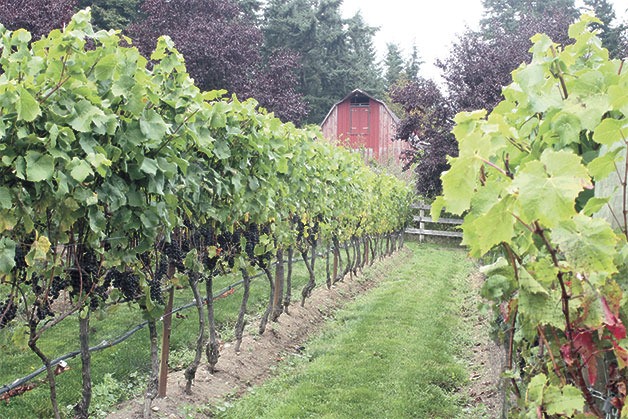Timing is everything.
And the Island County commissioners could not agree last week on when problematic regulations for wineries and rural event centers should be updated.
“It’s creating a problem. It has been creating a problem; it’s not a new problem,” said Commissioner Helen Price Johnson.
Commissioners reviewed specific changes to the code, and Price Johnson argued that the board push the winery ordinance update through the public process now. Commissioner Jill Johnson said those changes should be done within the scope of the ongoing Comprehensive Plan update due next year.
Commissioner Rick Hannold agreed.
“I support the wineries and the small-scale event centers. I agree the code … is pretty much a mess,” Hannold said. “My hope is we can wrap it all into one deal … one nice package.”
Ultimately, commissioners finally agreed to increase the permitting for a temporary rural event center permit from one year to two as a small gesture, allowing rural locations and wineries to book events more than a year in advance. This small code change will be brought to a future board meeting for approval.
Price Johnson argued for larger code changes because, she said, it is an immediate problem that needs to be addressed to allow people to run their businesses.
“We have specific contradictions that are causing problems right now,” Price Johnson said.
“I think it deserves to have the public conversations. We have a draft already. Just run it through for these code corrections. … It’s a very narrow focus.”
Business owners have waited long enough, Price Johnson said.
“We made promises to this community that it would be addressed,” Price Johnson said. “We have people trying to run a business on an annual permit.”
On the contrary, Johnson said that in efforts to eliminate “siloing,” or taking issues individually, the board should make the decisions within the Comp Plan update.
“In the context of not creating silos, it seems like where we are in the Comprehensive Plan, it seems like the best thing to do is to take those kind of conversations and roll them into the overall adoption of this process,” Johnson said. “Otherwise, what we’re doing is we’re gonna take away that comprehensive scope of work … and nothing is going to be integrated.”
Price Johnson countered that “those are very broad topics, I’m talking about specific language code, a very narrow focus. I’m not interested in having a broad agritourism conversation outside of the Comprehensive Plan. … You’re misunderstanding my request.”
Johnson stressed that she felt it would be unfair to take the winery discussion before others when other industries have been told to wait.
“We’ve said to multiple communities, ‘We get that you have a problem. You need to hold on until we update the comprehensive plan,’ ” Johnson said.
Hannold agreed that the discussion should be held within the larger scope of the Comp Plan, adding, “I’m just sitting here staying out of the fight.”
The larger code changes have been championed by Spoiled Dog Winery owner and new Planning Commission member Karen Krug, who said wineries and rural event centers are limited under the county’s current code.
Krug said that the board’s concession will help some rural event centers in the short term but doesn’t affect the long-term problems with the county’s code.
“It gives people predictability in wedding planning,” Krug said.
When it comes to wineries and rural event centers, Krug said that “such a conflict” within different parts of the code “doesn’t make any sense.”
“I’d like to see that part of the code cleaned up to make sense,” Krug said.
Carl and Rita Comfort, of Comfort Farm and Winery, wrote to the county on the issue, stating that “lacking clear definition, those wineries have been forced to conform to, and apply for, stated uses that are clumsy at best.”



